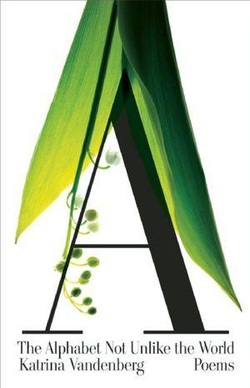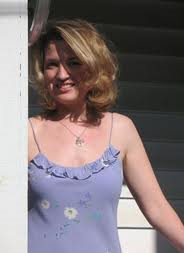Matthew Thorburn, Poet - Author of Dear Almost
Menu
 The Alphabet Not Unlike the World (Milkweed, 2012) is Katrina Vandenberg’s second book of poems. She is also the author of Atlas (Milkweed, 2004) and co-author, with Todd Boss, of the chapbook On Marriage (Red Dragonfly Press, 2008). She teaches in the Creative Writing Programs at Hamline University in Saint Paul, Minnesota and lives four blocks from campus with her husband, novelist John Reimringer, and their daughter Anna. Q: How did The Alphabet Not Unlike the World come together as a book? Did you set out to write a book of poems about the alphabet? Or did you write certain of these poems and then begin to see the shape a collection might take around them? I’m curious to hear about your process. A: Slowly. Partly because I wrote it in a six-year period while I was both trying to start a family, and publishing and promoting my first book, Atlas. The publication of Atlas had been swift, sudden, and unexpected; the child-bearing was slower, anxiety-inducing, and involved miscarriages, surgery, and hormone crashes. The book had two false starts. At first it was meant to be about my first partner Tim’s trip to Ireland after we graduated from college. I went to Ireland alone the summer before Atlas came out and, using his old travel journal, retraced his steps. Within a week there I knew I couldn’t write that book; it was his trip, not mine. Atlas was a book about grief, but when I published it, I closed the door on that part of my life. Then, the book was about adolescence and what it means to be a girl. It wasn’t until I was at the Amy Clampitt House in Lenox, right after we met at the Sewanee Writers’ Conference, that I began to write the alphabet poems; the bulk of the book was written in late 2008 and early 2009. So for me, a big challenge was trying to figure out how all these poems from three disparate projects fit together, if they did at all. There is an enormous cast of characters. Finally I saw a connecting thread: this is a book about forgiveness. I owe my first editor, Jim Cihlar, for helping me structure it in a way that created a coherent narrative. He had suggested that the first section be a sort of précis, showing the arc of the book in miniature. Q: There are several ghazals throughout the book, which help tie it together—and which are all letter poems, like “Prologue: A Ghazal” and “Z Ghazal,” the two that bookend the collection. What drew you to this particular form? A: When I got interested in writing about the letters’ history as pictures, I initially wanted to write all the letter poems as ghazals. The form felt right, and I liked that it came from the same part of the world that the letters did, though the form isn’t as old as the letters themselves. After writing a few, that window closed, and the alphabet poems started pushing into other directions, though if you look at the Q poem in particular, you can still see the ghost of the abandoned ghazal. Probably an entire book of alphabet ghazals would have been obnoxious. Q: One of the things I love about your poems is the way you include so much lived life and vivid visual detail. The poems are always about something—actually they are always about several somethings. I’m wondering, how does a poem start for you? Are there certain things that will trigger a poem or give you a way into a new poem? A: Sometimes it’s a line: “A Ghazal” started with my getting this line stuck in my head: “it is strong enough to pull the train of letters through the poem.” The poem “X” began with the phrase “I promise to write a poem about forgiveness. Even if this, even if that.” Other times, I get a prickly feeling in my head or a queasy feeling in my gut, and I know that I want to spend some writing time exploring an image or a memory or a word. I give my students prompts and poem ideas, and sometimes try them out myself — in particular, we sometimes play a game in which we force metaphors between two things we’ve been meaning to write about, just to see what happens — but really, my best poems begin in a way I can’t control and can’t explain. Mary Ruefle has an essay in Madness, Rack and Honey about how little is said about where poems begin, because no one knows. I can’t teach my students how to have that prickly feeling, only to respect it. Q: On a related note, these poems—especially the ones about individual letters, such as “X”—are filled with facts, trivia and snippets of history, yet this information feels entirely owned and embodied in the poems. There’s never that research-paper feeling of trying to squeeze all the relevant info in. I wonder if you could talk about what part research (however you’d define that) played in writing the poems, and how you translate research into poetry. A: Some of that is the kind of person I am, one who likes to know a little bit about a lot of things. In general, I think that, when it comes to research in a poem, one of two things has to happen. Either you have to have known the piece of information long enough that it has time to compost inside you and become yours. Or, the revising of a poem with research in it has to involve a lot of subtracting — pulling out and pulling out the extra show-offy bits. It’s surprising how small a kernel of research in a poem needs to be. But it also has to be the right snippet, so when I’ve used research, I’ve found that I progressively chisel away at it. I’m a slow writer, which might help in this case.  Q: In addition to being a poet, you’re also a mother and a teacher. As a new parent myself, I’m curious to know how you balance those three roles and manage to play all three? A: Badly? Or maybe it’s just always a work in progress. I talked about this a bit with the poet Molly Sutton Kiefer, on her wonderful blog Balancing the Tide: Motherhood and the Arts. The interview is here. But when I told her all of this, my child wasn’t walking yet, so I didn’t know the half of what it meant to teach, write, and parent a little person whose job is to get into everything. Students, writing, family — any one of these is willing to take everything you can give and then some. I’m a big list maker, I get up earlier than I used to, I’m willing to shell out as much as I can afford for child care. I have a spouse who truly co-parents. I’ve also had to acknowledge in the last 2-3 years that because my family is at the center of my life, I am willing to take the hit that comes from sitting on the sidelines a bit more, poetry-wise, while my daughter is small and needs me. I don’t think it anti-feminist or anti-art. I do think it’s very human, and my writing and teaching will ultimately be rewarded by it. Q: Lastly, what’s next? What are you working on now? A: These things never make sense when you describe them instead of just showing them to someone — who said that it’s impossible to paraphrase a poem? — but I’m working on a piece called Conservatory. It’s in the stage of its development where I’m not totally sure what it is, a book-length poem, a piece that bends genre, or both. It’s inspired by the source of our sanity as parents of an active toddler who lives in the frozen north. In the Marjorie McNeely Conservatory in Como Park, it is never winter. Two poems from The Alphabet Not Unlike the World: X I promise to solve for X. I promise I will write a poem about forgiveness. Even if it is April and another college boy has drowned in the Midwest. XX means “girl,” XY means “boy.” A serial killer, some say. Others: The boys are drunk and we have rivers. We also have rails, trestles in fields of corn, steel mills. A restless moon, a horizon you can see clear to, crows on telephone poles like Xs strung together. As unfertilized eggs we all begin as XXs. Even if we have lost dozens in the Mississippi, eight in LaCrosse alone, this poem is about forgiveness. It tries to solve for X—X the cross, X the Christ, X to X things out. The boy in Saint Cloud. The boy at Saint John’s, where the monks bake bread and copy the Bible by hand. When the moon is dark and new. X the unknown, X for times. X for ten, for more than ten. On the Web site’s map, the gravestones marked with little crosses pop up along I-94 like crocuses, until you can’t see one for another. It is Easter. The red-winged blackbirds are coming back to Minnesota, their wings’ tips feather the river along. The river is a swish of calligrapher’s ink, the boys are drowning inside the X-- X for stranger, Mr. X. I love the Mississippi, how it can mirror back the world without us in it. How it keeps insisting to the bluffs, Sandstone-- river—limestone—river—shale—river—river. The river of thoughts about Mr. X has worn through us almost that long. XO, I kiss you, the letter is sealed. I do not want to die without lifting a child of my own from the water. Earthworms It is raining again this morning. I remember it rained then, too, that summer morning we lay crosswise on the bed, the curtains grazing our heads, quickened by the damp wind. Outside, the earth was opening and the worms had surfaced, blind. They have eaten every bit of dirt that makes our yard. In bed at night, we turn the story of the child whose heart we never heard, the child who never heard rain. And we don’t care, we let it surface—we open ourselves, from time to time, to happiness.
0 Comments
Leave a Reply. |
 RSS Feed
RSS Feed
